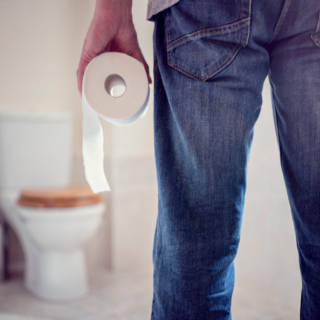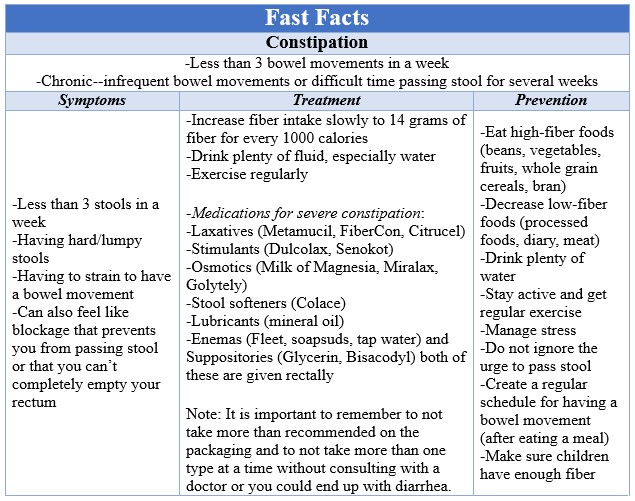Why can’t you go?
You’re in the bathroom on the toilet and no matter how hard you try, you aren’t able to have a bowel movement. We’ve all been there at some point, but eventually you are able to go and the relief you feel can be quite significant. Why is it so difficult to go sometimes? When should you been concerned about constipation?
 Definition
Definition
Constipation is having less than three bowel movements in a week. Occasional constipation is common for most people and is typically related to your diet. If you are eating foods low in fiber, this can cause the frequency of your bowel movements to decrease. A major concern is when you have chronic constipation. This is when you have infrequent bowel movements or difficult time passing stool for several weeks. You might have chronic constipation if you have less than three stools in a week, having hard/lumpy stools and have to strain to have a bowel movement. It can also feel like there is a blockage that prevents you from passing stool or that you can’t completely empty your rectum. If you have two or more of these symptoms for at least three months, you might have chronic constipation.
There are numerous things that can cause chronic constipation, but the primary reason is usually related to a low-fiber diet that causes stool to move slowly or stop in the colon/rectum. This can turn into a blockage causing a bowel obstruction. Other causes can be related to bowel stricture (narrowing of colon), anal fissure (tear in the wall of the anus causing stool to leak into surrounding areas), problems with nerves that control the movement within the colon/rectum (autonomic neuropathy, Parkinson’s, Multiple Sclerosis, spinal cord injuries, stroke), issues with the abdominal/pelvic muscles that aid in movement of stool through the intestines, conditions that alter hormones that help with the body fluid balance (diabetes, hyperparathyroidism, pregnancy, hypothyroidism) and various types of cancer (rectal, colon).
Treatment
The main treatment for constipation is to increase your fiber intake. The key is to remember to do this slowly because you can have bloating and gas if you don’t. The general recommendation is to have 14 grams of fiber for every 1000 calories that you ingest. The other essential component to treating constipation is to drink plenty of fluid, especially water. Besides fiber, your body needs water to help propel stool through your intestines. Exercise also plays a key role in moving stool through your bowels. It is important to not ignore the urge to have a bowel movement. If your constipation is severe, you can try one of several medications. It is important to remember to not take more than recommended on the packaging and to not take more than one type at a time without consulting with a doctor or you could end up with diarrhea. Laxatives (Metamucil, FiberCon, Citrucel) are fiber supplements and help to add bulk to your stool. Stimulants (Dulcolax, Senokot) help to increase the contractions of the muscles of your intestines. Osmotics (Milk of Magnesia, Miralax, Golytely) help to draw fluid into your intestines to soften stool. Stool softeners (Colace) help to moisten stool and make it easier to move. Lubricants (mineral oil) help to smooth the movement of stool through the intestines. Enemas (Fleet, soapsuds, tap water) and Suppositories (Glycerin, Bisacodyl) help to soften stool via substances placed directly into the rectum rather than orally as is the case with all the other forms of medication.
Prevention
In order to prevention constipation, it is important to eat foods high in fiber, such as beans, vegetables, fruits, whole grain cereals and bran. It is essential to decrease the amount of low-fiber foods (processed foods, diary, meat). Drinking plenty of water is vital to having enough fluid to move stool through your intestines. Staying active and getting regular exercise also promotes regular bowel movements. When you’re stressed, you have less frequent bowel movements. So, managing stress is helpful in regulating stool passage. Do not ignore the urge to pass stool and try to create a regular schedule for having a bowel movement, such as after eating a meal. If you have children, it is important to make sure that they are getting enough fiber.
Constipation can be uncomfortable, but it is easily treated and prevented. Now you have the tools to be constipation free. If you have any questions, please talk with your doctor. If you would like more information, please visit National Health Institute’s constipation page at https://www.niddk.nih.gov/health-information/digestive-diseases/constipation